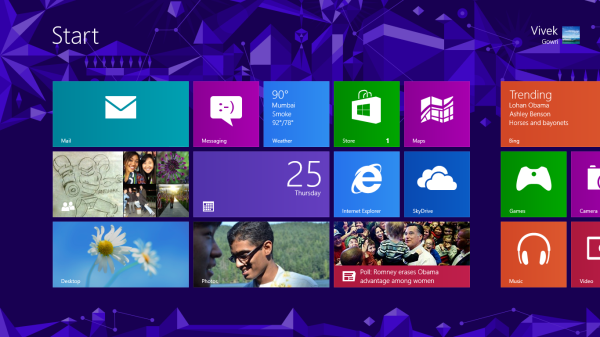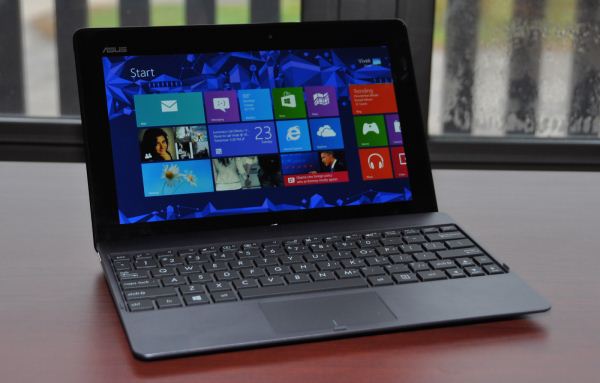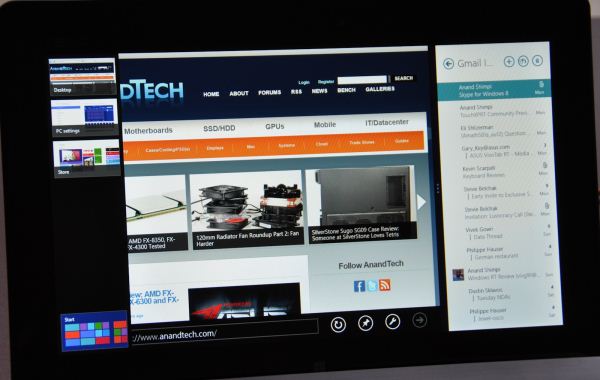The Windows RT Review
by Vivek Gowri & Anand Lal Shimpi on October 25, 2012 12:00 PM EST- Posted in
- Windows RT
- Operating Systems
- Microsoft
- Mobile
- Windows 8
- Tablets
Final Words
So, ten thousand words later, what can we take away from Windows RT? It’s definitely another superb user experience design from Microsoft. Say what you will about Windows Phone 7, but damn if that UI isn’t gorgeous. The Metro design language translates over to the tablet form factor really well, resulting in the Windows Modern UI. We’ve obviously known how Modern UI looks and feels through the various Windows 8 preview builds, but Windows RT ends up being more focused and offering a more consistent experience. It’s a side effect of being limited to apps from the Windows Store - because you spend a significant majority of your time in the new Windows UI, desktop use is minimized. In Windows RT, the Windows Desktop serves the purpose of being the more capable and powerful layer underneath the main portion of the UI, as opposed to Windows 8, which sometimes feels like the new Windows UI existing as an impractical interface layer on top of the traditional desktop.
The dichotomy just feels more comfortable in Windows RT than I feel like it has been in the previous Windows 8 systems that I’ve dealt with. It’s nice. This is the first time I feel like I’ve really connected with the new Windows UI, it makes a ton of sense to me now. I still think for mouse-based navigation, you’re better off treating it as a glorified Start menu, but it’ll be interesting to see how legacy programs affect the use of Modern UI in x86-based Windows 8 tablets as the Windows Store matures.
If you’re really concerned about the state of third-party apps, you just have to wait and see. I’ve seen a lot of snap judgements made about Windows RT in the last couple of days based on the dearth of good applications in Windows Store, and while I agree with that sentiment, I feel like it’s extremely shortsighted to write off the ecosystem already. Neither version of the OS has gone on sale yet, and we know that there are a number of applications that will go live on the official release date, as well as many more coming in the weeks ahead.
This isn’t like Windows Phone, where we need to see whether the platform will get any market traction before predicting the growth of the app marketplace. You can basically assume that the marketplace will expand significantly unless somehow everyone stops buying Windows-based systems on October 26th. The odds of that situation arising seem relatively low, so my bet is that the strength of the ecosystem will be a non-issue a month from now.
The default inclusion of Office 2013 and the emphasis on physical keyboards makes Windows RT the first tablet platform to significantly address the question of productivity. Combined with the equally advanced task switching and multitasking built into the UI, and this becomes the first legitimately useful tablet operating system out there. The Galaxy Note 10.1 wasn’t bad, but it was a single device that built additional functionality into a custom Android skin. Every single Windows RT slate comes out of the box with Office and the ability to have multiple active application windows. It’s just a few steps ahead of competing tablet platforms at this point.
And it’s not like RT loses out on a content consumption front. It’s paired with what is a very strong entertainment store and gaming franchise in Xbox Live, and the browsing experience is definitely competitive. It’s also a competent e-reader, with Amazon’s Kindle being one of the headlining apps currently in Windows Store. It even matches the power efficiency of the other ARM-based tablets, with competitive battery life and standby time. Obviously, ARM is the driving factor in the low power consumption, but it’s good to see that Windows is on a similar level as iOS and Android.
So this is a tablet platform that can do a good job of replacing both an iPad and an ultraportable in a number of different workflows. You get the best of both worlds, in some sense - Windows RT tablets have similar form factors to the iPad and leading Android tablets, and offer near-equal battery life, performance, and user experience, but they also give you the added benefit of strong productivity applications and the power of Windows Desktop. From a conceptual standpoint, almost anything you can do with an iPad can be done equally well (or close) on a Windows RT tablet, but the desktop-caliber office suite and versatile multitasking interface of Windows RT are impossible experiences to replicate on the iPad. It's not a perfect operating system by any means, but it brings a new dimension to the tablet space. So if you’re looking for a new tablet this fall, Windows RT deserves your consideration.













233 Comments
View All Comments
MadMan007 - Thursday, October 25, 2012 - link
I forgot about the base 10 versus base 2 conversion, which affects every single device of any kind out there (no one headline advertises base 2 sizes), but that still leaves over 4GB 'missing' even before the OS install. 4GB is a lot of non-video media or space for apps (I imagine app size is comarable to other ARM OSes because of Windows Phone.)Perhaps that's why we're seeing such memory sizes and pricing for Windows tablets, to make them comparable to other OSes, but companies can put flash for the same price in other tablets as well. Maybe they will and just enjoy better margins, or maybe they will and just price them lower.
daboochmeister - Thursday, October 25, 2012 - link
One of the things that's held me back from buying an Xbox is that it's $5/month to be a member of their community, so that you can chat with friends, have trophies saved, play multiplayer games, etc. As opposed to free with the Playstation Network, for example.Is there any kind of implicit tax like that in order to use this as a gaming device? If you don't have an Xbox and don't join any such paywall-portal, do you lose access to any games, or capability within any games you do have?
mcnabney - Thursday, October 25, 2012 - link
You will never install anything on RT that is not Microsoft approved and they will get a cut of the money too. Unsigned apps cannot be installed on RT - and only apps sold specifically to YOU on the MS App store are signed.But no, there won't be a monthly fee just to have a Surface tablet. The apps you want to run might...
Visual - Friday, October 26, 2012 - link
Uh... "you can chat with friends, have trophies saved" even without Xbox Live Gold. In other words, it is free. You only need to pay to play in multiplayer.aepxc - Thursday, October 25, 2012 - link
The review seems to indicate that Windows RT is an OS for desktop computing, but with a touch layer. But what does touch add to desktop computing? In what situations would a Windows RT tablet be preferable to a Windows 7 ultrabook? Or is it just a question of a Windows RT device being cheaper (especially taking into account the bundled Office) by much more than it is worse?VivekGowri - Thursday, October 25, 2012 - link
No? It's an OS for touch computing, with the traditional desktop layer underneath. I tried to spell that out as clearly as possible in the conclusion.aepxc - Thursday, October 25, 2012 - link
That's the argument that I did not really understand. To me, the clearest distinction between computing pre-Android/iOS and the computing those OSs have now enabled, lies not in how you do things (with gestures and touch) but in what you do. I used "desktop computing" in my initial post in the sense of activities one would do at a desk, to the exclusion of the outside environment. Android and iOS ('mobile', 'post-PC', whatever) seem to me to instead focus on tasks that augment one's environment. Google Now or the iPad's use as a flight bag, or Kindle's textbooks (or even messaging services that are more SMS than IRC in spirit) would, to me, be emblematic of the new approach.What you praise WinRT for -- multitasking, (computer-centric) productivity, etc. would to me be very 'desktop' (again, in the sense above) centred. Given that, they are already very well (IMHO, better) served by Win7. Hence my original question -- what does touch (especially at the expense of lower power and a smaller screen) bring to the game? What does it do better than an ultrabook?
ludikraut - Thursday, October 25, 2012 - link
Having used the Windows 8 beta on an Asus EP121 tablet, I can attest to what Vivek is saying. To me Windows 8 (any version) on a tablet, at a minimum, extends the capability of what we might call the 'traditional' tablet (e.g., iPad, Andriod) by allowing me to use it effectively for productivity apps like Office. Trying to write long e-mails, online posts, word docs, etc. on an iPad, for example, is an exercise in extreme frustration to me. No such issue on Win8.So to me Windows RT offers an expanded tablet experience, if you will, and full-blown Windows 8 on a powerful tablet allows me to ditch all of my other tablets and notebooks in favor of a single device. A Haswell version of something like the Asus Transformer Book is what I'll be waiting for.
l8r)
steven75 - Friday, November 2, 2012 - link
"Trying to write long e-mails, online posts, word docs, etc. on an iPad, for example, is an exercise in extreme frustration to me."And why are the same not any issue on Windows RT? Because you connected a hardware keyboard?
Then why not do the same with an iPad?
karasaj - Thursday, October 25, 2012 - link
Well for starters (imo), battery life and portability. Find a 600$ ultrabook constructed as well as surface. You won't. Many people have given it the same quality as Apple's products.You can't compare things one to one and expect something reasonable. In a world where surface and ultrabooks are the only things that exist, and specs are all that matters, yes, ultrabooks come out on top.
Look at the ipad though. Sure, it has apps. But x86 has WAY more. x86 is WAY more powerful. But more people buy the iPad than many windows computers. Tablets (despite being low power) are cannibalizing the PC market. Why is this?
All day battery life, family friendly media consumption, etc. Sure, an ultrabook does all of this - so why doesn't it sell as well? Tablets have a certain appeal - being able to sit in bed and lay on your side and watch netflix without worrying about a keyboard for example. Having 10+ hours of battery life while internet browsing (many notebooks, even ultrabooks, achieve half that).
Now look at Surface. Don't compare it JUST to an ultrabook. Do both. It's bringing a level of productivity to tablets that never existed. I (as a student) can take Surface and take notes with it in class on Office, and watch movies in bed with it. Tablet's have an appeal because they excel at their tasks - media consumption and (now) basic productivity. You don't *need* more power for those things. If you have more complex needs, then of course you need a laptop.
But if all you do is Netflix, office, and the occasional game, + internet browsing, (me), there's no difference. Surface can do all that and be more or less just as smooth. Applications might take longer to load, but that's a one time thing that can even be improved with software optimization. I have a desktop for more powerful needs (gaming, programming).
PCs have always been more powerful, but their sales are declining. That's because the average consumer (a media consumer, not a power user) puts more emphasis on portability than having a quad core i7 - they don't need that much power.